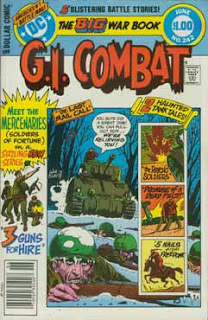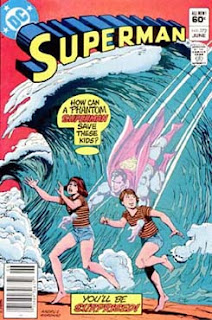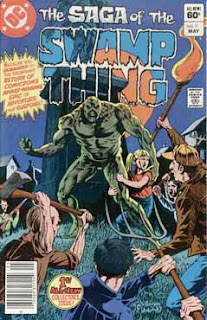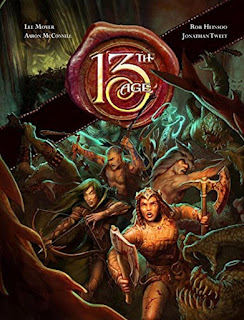Wednesday, March 8, 2023
Wednesday Comics: DC, June 1982 (week 2)
Monday, March 6, 2023
13th Age: The Strangling Sea
Last night we had our first actual session of 13th Age (after a character creation session). I was running the adventure The Strangling Sea. The setup for the adventure is based on the character's relationships and some random rolls, so we were perhaps a little slower getting started that normal (of course the biggest delay is always the pre-game chitchat), but it ran pretty smooth after that being a D&D derivative.
The party was sent by a wizardly patron connected with the Archmage to find a missing artificer. Their only clue was a friend of his in a distance town. This necessitated a travel montage, which is one of 13th Age's dfferences from other sorts of D&D, which asks the player's to essential describe what happened in a round-robin description of incidents. There seems to be a bit of reticence here in the players' parts, surprising since all of them have run games before and two have published works. Likely, it was just being put on the spot.
After the travel we got to the only combat of the adventure. A battle with some thugs in service of the Diabolist:
The player's triumphed, though without the escalation die, it might have been a close thing.
Thursday, March 2, 2023
Imagining the Hyborian Age
The map of Conan's world by Katrin Dirim I shared the other day was interesting not just because her her artistic style (though that's great), but because of the way she chose to depict the Hyborian Age costume and material culture. The prevailing style, since the Frazetta covers have been a vague "barbaric fantasy," which each artist working their own variation on the theme.
Howard's stories, by contrast, tend to be much more "historical" in their depiction of these things--though they aren't really consistent in their historical era. Different locales in Conan's world seem to come from different points in history: there are High Medieval tales ("Hour of the Dragon", "A Witch Shall Be Born"), Golden Age of Piracy stories ("Black Stranger"), stories that seem to be set in the ancient world ("God in the Bowl"), and even stories that like ahistorical periods of a Medieval version of the 18th Century ("Beyond the Black River").
I think Dirm's idea to narrow this range a bit to make it make more sense is a good one. On Reddit, she says she capped the level of armor at roughly the early middle ages, and mixed in elements from as far back as the Bronze Age to keep the atmosphere.
I think this fits well with the more "ancient world" interpretation Mark Schultz does in volume 1 of the Wandering Star/Del Rey collection:
Some of the slight re-shifts of the names would be fairly simple. Iranistan becomes the Persian Empire (take you pick which one), and Turan instead of being a stand-in for the Ottoman Turks, are maybe the Parthians? Aquilonia and Nemedian could be recast as somewhat Carolingian Frank:
Though I have seen portrayals (and there is some support for it) that Aquilonia could be Roman!
The Age of Sail stuff in Zingara and the Barachan Isles would require the most change, but there have been pirates as long as there have been boats, so it's possible.
Wednesday, March 1, 2023
Wednesday Comics: DC, June 1982 (week 1)
Monday, February 27, 2023
The Essential Elf
What's an elf? For a lot of people, it seems to come down to pointy ears. (See any discussion about the accuracy of Talislanta's "No Elves" tagline line--which really seems to upset a lot of people--or discussion of Vulcans as "Space Elves.") Tvtropes, of course, has some ideas, but I feel like their definition only skirts the narrative use of elves in fantasy, mixing both surface characteristics and other qualities. My list overlaps in some places but has some differences. Not all elves or elf-like beings have all of these traits or possess the ones they do have to the same degree, but they tend to have the majority of them to a greater than humans (or whatever the baseline group of the setting is) in a work.
The qualities are:
- Otherworldliness. Magical, mythic, or nonmaterialness. This is probably the essential elven trait.
- Scale. Supra- or metahumanness.
- Alien. Nonhumanness in outlook/mentality.
- Morality. Association with greater moral clarity/absolutism.
Friday, February 24, 2023
Hither Came Conan...
This map of the Hyborian Age world by Katrin Dirim is pretty cool, and gives a different sort of vibe than typical illustration of Conan's world. There are a couple of illustrations from Conan stories, too. You should check them out!
Wednesday, February 22, 2023
Wednesday Comics: DC, May 1982 (week 4)
Monday, February 20, 2023
Elements of 80s Fantasy Style
Thursday, February 16, 2023
The Delver Underworld
In wuxia fiction, the characters are members of the Wulin, the World of the Martial Arts or community of martial arts practitioners. This term has overlap with, but is not identical to Jianghu, which is the sort of demimonde/underworld that includes the Wulin practitioners and associated people and locations.
While D&D and D&Dish settings sometimes feature guilds adventures are members of, I don't think I've ever seen this developed into a full-fledged community analogous to the Jianghu or Wulin. As I've briefly suggested before, there are a number of interesting developments taking this sort of approach would allow, though. Just off the top of my head:
- Schools of magic using types would be given an in-setting function.
- It would provide an in-setting rationale for the separation between adventuring clerics and stay in the temple priests
- The "keeping the Martial (or in this case Adventuring) World" separate from "civilians" aspect of wuxia would explain why adventurers are running every kingdom in the land.
- It would seem to naturally lead to more rivalry between adventuring groups, potentially meaning more faction play within dungeons.
- Guilds/sects/collegia are an easy source of adventure hooks.
Wednesday, February 15, 2023
Wednesday Comics: DC, May 1982 (week 3)
Monday, February 13, 2023
Weird Revisited: Froglings for 5e
Frox or Bufokin (a bit of a misnomer, as frox resemble frogs more than their warty, dry-skinned cousins) are amphibious humanoids native to the bottomlands and marshes of the country of Yanth. Following rivers, they've ranged beyond their ancestral home to be a common sight in river towns. Their call and response work songs can be heard dockside all over Azurth. Frox work as bargemen or stevedores in civilized areas, and as hunters, farmers, or guides in their villages.
Frox legends say they come from a land across the Boundless Sea, which they left to escape persecution by a terrible and poisonous race of toad-folk, but this claim is considered doubtful by the scholars of Azurth for many reasons--not the least of which being that the Boundless Sea has no other side!
Frox are generally shorter than humans and tend to be thinner of limb, though many develop a potbelly as they age. Their skin colors are generally a dull green or brown, though they range from muted reds to purplish-gray.
 |
| A wealthy Frox businessman and tribal chieftain visiting the palace |
Frox Traits
Ability Score Increase. Dexterity increased by 2 and another ability score by 1.
Age. Frox live shorter lifespans than humans on average with only a few living beyond their mid-60s. They are mature by their early teens.
Alignment. Frox tend toward good but are have no special affinity for Law and Chaos.
Size. Frox are between 3 and 4 feet tall. Small.
Speed. Base walking speed in 25 feet.
Jumper. Frox can long jump their full Strength score in feet from standing start, and double their Strength in feet with at least 10 feet of movement in a running start. They can high jump a total of 6 feet (rather than the usual 3) + their Strength modifier in a moving high jump and half that for a standing jump. They have an advantage on Dexterity (Acrobatics) checks to land in difficult terrain.
Swimmer. Frox can swim at their full movement rate and rough waters only cost them 1 extra foot for each foot of movement. They use double their Constitution modifier for the purposes of holding their breath.
Resistance to Poisons. Frox have an advantage on saving throws against poison and resistance against poison damage.
Moisture Dependent. Frox require twice as much water as most races. However, submerging most of their body in water for 20 minutes or more reduces their requirement to standard levels.
Languages. Frox can speak and read (limited) Common. They also speak their on croaking, chirping tongue, which has no written form.
[Thanks to Evan Elkins, the creator of the Froglings, the basis for the Frox.]
 |
| A frox traditional dwelling |
Friday, February 10, 2023
Weird Revisited: Found in a Shoebox
The most dangerous photo of the lot. If stared at during night, the photo may open a portal to the pictured manor in a strange demi-realm shrouded in mist and populated by people who appeared to come from a gothic horror yarn. Anyone transported to the realm will be there for 24 hours on earth--though the exact time in the demi-realm is variable: anything from one night to a two weeks.
The Succubus
Naughty postcard from roughly 40 years ago. It can be used to summon a succubus once per week if the incantation written on back is read and a few drops of the summoners blood (or other body fluid) is spilled into a circle draw on the floor.
Wednesday, February 8, 2023
Wednesday Comics: DC, May 1982 (week 2)
Monday, February 6, 2023
13th Age
I've had the 13th Age core book for sometime, but after picking up most of the rest of the publications for the game in a recent Bundle of Holding, I decided to give it a try. My online group was willing to give it a try.
For the unfamiliar, 13th Age is sort of an "alternate evolution" of D&D. Debuting in 2013, it sort sort of took D&D 4e and stepped in a rules lighter direction, adding some freeform elements, quite different from the specification of 3e versions of the game. It's roughly equivalent in crunch, I would say, to 5e, but lighter than 5e in some areas.
We spent the first session in character creation. It took perhaps a little longer than 5e because the freeform elements required a little more thought. What are these elements? Well, the biggest is that every character has "One Unique Thing" some (noncombat) thing that sets them apart from perhaps everyone else. Not only does this serve as a character hook, but it allows the player to define something about the world.
Then there are backgrounds. Unlike 5e backgrounds which are essentially packages of skills and accoutrements, 13th Age backgrounds are player defined (and presumably GM negotiated) broad skills. You could do something simple like "Miner," but it could also be something like (one my wife picked) "Gnomish Debutante." Like the One Unique Thing, backgrounds have the effect of fleshing out the world to a degree. The only downside I see to them is that characters might not be as "well-rounded" in the arena of adventure related tasks as their 5e counterparts. Still, that just means that (like older versions of D&D) skills are likely of less importance.
One final element not found in typical D&D is that every character has a relationship to one of the settings Icons, vaguely defined (so the GM can flesh them out more) beings of great power and importance in the setting. Characters can have a positive, conflicted, or negative relationship with one or more Icons. These are meant to be adventure hooks. You roll to see when they might come into play.
Anyway, the group seem to like what they've seen of the system so far and are interested in giving it a go.


























































